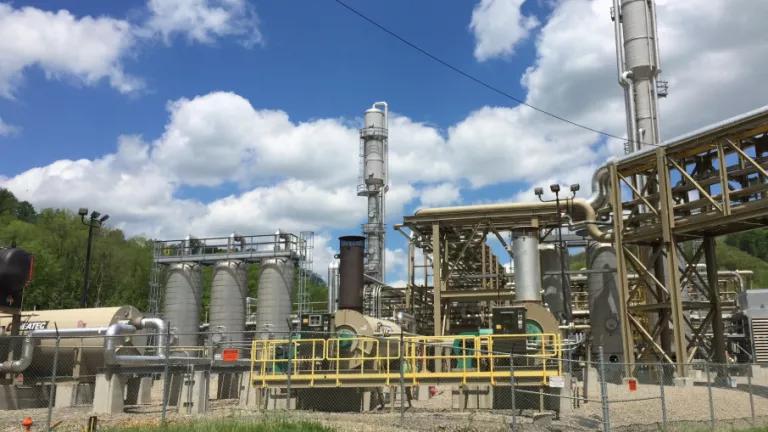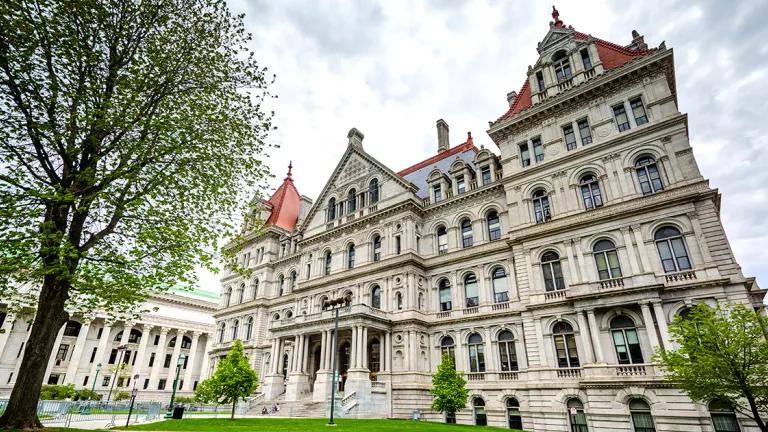NY Legislature Passes Bill to Close Fracking Waste Loophole
After years of deadlock, key legislation that regulates oil and gas waste passed the New York State Legislature this week. The legislation closes a longstanding and dangerous loophole that exempts dangerous oil and gas industry waste from New York’s existing hazardous waste regulations.

A fracked gas processing facility in Western Pennsylvania
Update: In a victory for New Yorkers’ public health and environment, Governor Cuomo signed this legislation into law on August 3.
After years of deadlock, key legislation that regulates oil and gas waste passed the New York State Legislature this week. The legislation, sponsored by Senator Rachel May and Assemblymember Steve Englebright, closes a longstanding and dangerous loophole that exempts dangerous oil and gas industry waste from New York’s existing hazardous waste regulations.
New York remains threatened by fracking waste carted in from out of state operations, along with waste that comes from existing in-state conventional wells despite a statewide fracking ban that went into effect in 2015 and was signed into law this year. Some of the liquid waste “brine” from conventional wells in-state is used as a road deicer during winter months. According to records maintained by Pennsylvania’s Department of Environmental Protection, seven landfills across New York have accepted over 600,000 tons of contaminated solid and liquid waste from fracked wells in Pennsylvania since 2011. Waste products include drill cuttings, contaminated tarps, and wastewater, and some of it is even radioactive. NRDC and our partners across the region recently came together to publish an analysis of the impacts of closing the hazardous waste loophole for oil and gas waste.
The federal Resource Conservation and Recovery Act (RCRA) requires the safe disposal of solid waste and hazardous materials in order to protect human health and the environment. However, a 1980 amendment to the law exempts waste from oil and gas exploration, development, or production, from regulation. The intent was to have states enact their own protections, but unfortunately, New York State never acted, so waste from oil and gas operations in and out of state can be sent to ordinary landfills and wastewater treatment facilities, and can eventually end up in waterways that supply drinking water to millions of people.
Oil and gas fracking utilizes over 1,000 chemical additives, many of which are toxic and carcinogenic. Studies have found that more than 75 percent of the chemicals used in fracking are associated with adverse effects on the skin, eyes, respiratory and gastrointestinal systems; 40 percent could have effects on the brain and nervous system, immune and cardiovascular systems, the kidneys and endocrine system; and 25 percent of the toxins are associated with cancer and mutations. These threats to public health are present well beyond the footprint of the fracking well, even in states like New York where fracking is banned.
Closing the oil and gas hazardous waste loophole would make New York the first state in the nation to apply hazardous waste laws to oil and gas waste. And it would subject oil and gas waste to laboratory analysis to determine if it is hazardous and ensure that waste disposal is taking place only at facilitates that can safely handle it. Additionally, if waste is determined to be hazardous, “brine” would not be allowed to be used for deicer on New York State roadways, which would keep toxic chemicals out of our waterways.
The State Legislature has answered the call to close this dangerous loophole and ensure that toxic oil and gas waste is subject to the same reporting requirements and special treatment as other industrial waste. We banned fracking in New York and it's time long past time to block its waste from poisoning communities. We now urge Governor Cuomo to sign this important legislation into law and protect the health and safety of all New Yorkers from the dangers of oil and gas waste.



